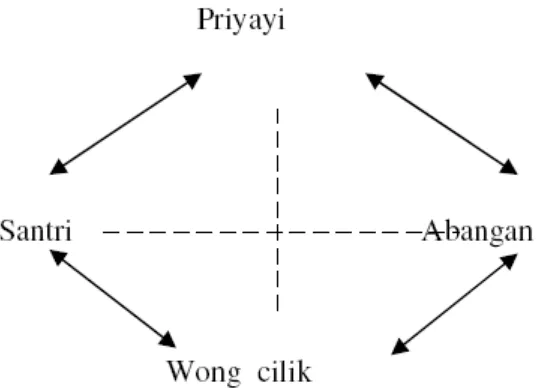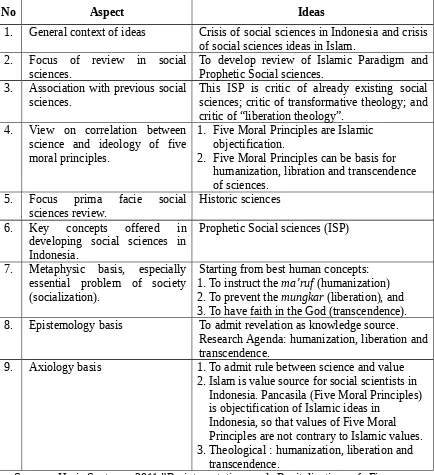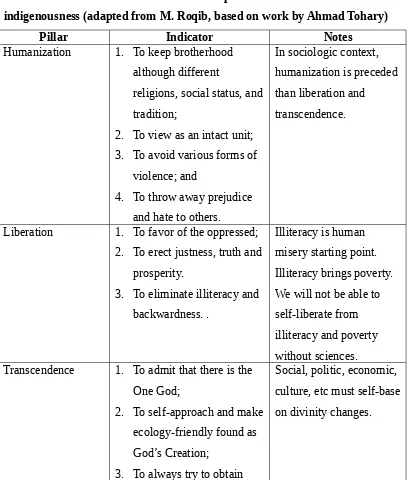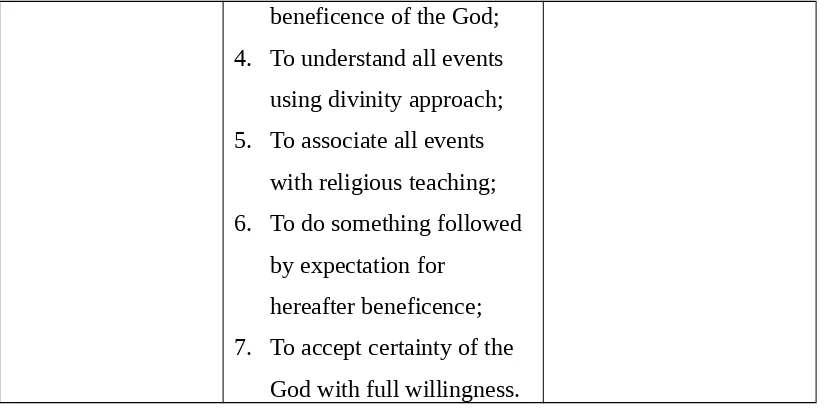A POLITICS OF SCIENCE DEVELOPMENT: The Development of Prophetic Social Sciences Model1
Nasiwan, Ajat Sudrajat, Cholisin
The head of FISTRANS Institute, Lecturers at Faculty of Social Sciences, Yogyakarta State University
Abstract
The long term goal of this research is to produce theories and concepts of social sciences which are developed based on the values, behavior, phenomena, events, social relations growing in Indonesia. These indigenous theories and concepts contribute to solve the social problems in Indonesia, for example the education sector which fails to produce generations who have nationalism, autonomy, and characters. One of the solutions to cope this problem as proposed by Kuntowijoyo is developing Prophetic Social Sciences- social sciences which not only explain and change the social phenomenon but also give direction to which, by whom, and for what the transformation is performed. The intended transformation include emancipation, liberation, transcendence, and prophetic.
The specific target in this research is developing a model for prophetic social sciences in the form of an Indigenous-based Social Sciences curriculum blue print which greatly contributes to the formulation of a new curriculum at Faculty of Social Sciences, Yogyakarta State University. The research method employed in this research is Research and Development method (Thiagarajan, S., et.al., 1974) known as a Four-D model which is modified with R&D model (Borg &Gall, 1983). Moreover, the research stages consist of Define, design, develop, and disseminate equipped with Phenomenology methods.
In the development phase, the research has produced a curriculum blue print for developing indigenous prophetic social sciences in the form of a guideline for developing a syllabus of prophetic social sciences course, independent science course, integrated social sciences, lesson plan and prophetic social sciences textbooks. The development of Prophetic Social Sciences aims at producing a theory and concept based on the local wisdom and socio cultural which grow in Indonesian societies to solve the social problems in Indonesia.
Keywords: indigenization, Prophetic Social Sciences, curriculum
1. Introduction
developed by a Dutch scholar to understand culture, Dutch Indies society (native). Objectives of indology development are to give data/information to the Dutch Indies Government to better understand deeply Indonesian society, the Dutch had chance to extend colonialism in Indonesia. The case of indology may develop a specific scientific discipline associated with politics of science development). The specific scientific discipline cannot be separated from powerful regime so that choice to develop or not develop scientific discipline is affected by policy of the powerful regime or education politics.
It is also true in a science called oriental, science developed to understand east culture. It is neither separated from west interest to dominate east nations. If we take lesson from such two cases, we may take abstraction indicating that development of other social sciences such as development economic, sociology and anthropology can be found associated with state interests or regime developing this science where ending is to strengthen the relevant regime position (such as international company/international capitalism).
In this context, development of Prophetic Social sciences model in Indonesia, especially in Social sciences Faculty of UNY can be positioned as a part of academic politics or politics of social sciences development. This paper discusses conception of Prophetic Social sciences, context of origin and learning.
2. The Conception of Prophetic Social sciences
sciences of import result in solving various social sciences problems occurring in Indonesia.
Serious problems facing social scientists in Indonesia are how to present social sciences able to transform? Why is it necessary to focus on this question/ it is due to social sciences in this decade is till experiencing stagnation. Social sciences needed is not only able to explain social phenomena, but also transform the social phenomena, to which the transformation id conducted, what for and by whom? According to reflection by Kuntowijoyo in facing these problems, academic and critical social sciences cannot give clear answer (Kuntowijoyo, 2006:86, AM Saefuddin, 2010:39-49).
Solution offered by Kuntowijoyo is to build Prophetic Social sciences, namely, social sciences which does not only explain and change social phenomena, but also give instruction to which the transformation is conducted, what for and by whom? Therefore, Prophetic Social sciences does not only do change for change, but also transformation based on certain ethical and prophetic inspirations. In this case, Prophetic Social sciences contains deliberately values of change inspirations desired by people. According to Kuntowijoyo, desirable change direction is based on humanization/emancipation inspirations, liberation and transcendence, a prophetic inspiration derived from historic mission of Islam as contained in Article of Ali Imron, Paragraph 11- (Kuntowijoyo, 2006:87).
Some critics and improvement of Geertz’s concept are made by Kuntowijoyo. According to him, now (1980s and 1990s), classification of
Polarization Liquefaction of relationship between santri, abangan and priyayi
Figure 1.1. Polarization Liquefaction of relationship between santri, abangan and priyayi
Nevertheless, sociologically, in religious life, each religious follower has a set of rules and behavior patterns as regulator of the group community (Jackson, 1986). For Moslem, value rule is derived from Quran, Sunnah Rasulullah, or other value systems which are adapted and not contrary to the Quran and Sunnah Rasulullah. It is consistent with perspective as standard principle indicating that Indonesian Islam is result of interview with normative Moslems derived from Great Tradition in Middle East and local context of Indonesia (Azyumardi Azra, 2002:24).
In view of Prophetic Social sciences suggested by Kunto, holy text of Quran can be positioned as value/norm, that can then be transformed into
“Identitas Politik Umat Islam” (Political Identity of Moslems), especially in Chapter VI and Chapter VII, that is deeply Islamic objectification theme. This book was published in June of 1997 by Mizan publisher, some moments before era of reformation occurred, where appearance of independence season sprouting phenomena is to establish politic parties, including growth of Islamic politic parties.
3. Results and discussion
Of literature study on Prophetic Social sciences (ISP), association with this study need to present a conception on Prophetic Social sciences, it is necessary to make a conceptual map to better understand Prophetic Social sciences. To ease understanding of Prophetic Social sciences, this flow of systematic discussion is first, to describe state of the art, context of Prophetic Social sciences source in discourse of social sciences development; second, to describe construction of Prophetic Social sciences, key concepts of Prophetic Social sciences; third, dialectic of Prophetic Social sciences in academic life in Faculty of social sciences (FIS) of State University of Yogyakarta.
1) Context of Prophetic Social sciences source
are remaining roles, these are roles that widely function to give policy legitimacy that has been taken by the ruling regime. In long time, roles of social scientists and social sciences have been replaced by the ruling regime domination.
Others giving background of Prophetic Social sciences origin are dominations of Academic Social sciences Thought derived from United States. Namely, in what is called as functionalism. This concept is derived from optimism in systems of United States of America. In further development, functionalism is considered as one only academic, objective and empirical social sciences, pioneered by Talcott Parsons. Functionalism widely emphasizes on systems, equilibrium, adaptation, maintenance, and latency so that it seems to be conservative. Such condition finally results in criticism of functionalism flow in social sciences because the flow does not emphasize on changes and transformation.
Prophetic Social sciences of origin context is also associated with appearance of criticism against academic social sciences (value-free, empirical, analytical, liberal) less caring for values, separation between revelation-religion and economics, religion and politics and religion and sciences. In further development, flow separating religion from sciences follows principle of de-differentiation. Post modernism does not agree a view separating religion from sciences.
2) Construction of Prophetic Social sciences based on indigenousness Development of Prophetic Social sciences based on indigenousness seen from sides of indigenousness levels systematically can follow steps as reflected in the table of indigenousness levels of social sciences:
Table 5.1. Indigenousness Levels of Social sciences
No LEVEL NOTES
(Meta-theoretical) worldviews, ideology, and philosophical assumptions similar to social sciences and products..
2 Theoretic (Theoretical)
Indigenousness refers to theories or concepts developed from the practiced historic experiences of native people.
3 Empiric
(Empirical)
Indigenousness focuses on review of actual problems facing local people that previously got less attentions, such as, topics concerning corruption, cultural imperialism, etc.
4 Application (Applied)
Indigenousness is manifested in program policy specification steps and activities, as well as socialization of implementation.
Where: indigenousness phases in practice are not too tangible and conspicuous.
Considering the indigenousness levels of social sciences, as illustrated in the table above, it may be stated that Development of Prophetic Social sciences Models based on indigenousness of social sciences implemented in the Faculty of Social sciences, State University of Yogyakarta, consists of four levels, both at meta-theoretic, theoretic, empiric and applied levels. Why it is so, because conducted observation results in FIS is not only socialization (application) of ideas on Prophetic Social sciences and ideas on indigenousness, but it is more than it, it is associated with tracking of philosophical bases (ontology, epistemology and axiology) of Prophetic Social sciences Model Development design in FIS. This context also develops syllabus arrangement guidance draft syllabus arrangement in two models, namely, substantive syllabus and reflective syllabus of integrated Prophetic Social sciences, lesson plan (RPP) is also developed.
Table 5.2. Idea by Kuntowijoyo: Prophetic Social sciences
No Aspect Ideas
1. General context of ideas Crisis of social sciences in Indonesia and crisis of social sciences ideas in Islam.
2. Focus of review in social sciences.
To develop review of Islamic Paradigm and Prophetic Social sciences.
3. Association with previous social sciences.
This ISP is critic of already existing social sciences; critic of transformative theology; and critic of “liberation theology”.
4. View on correlation between science and ideology of five moral principles.
1. Five Moral Principles are Islamic objectification.
2. Five Moral Principles can be basis for humanization, libration and transcendence of sciences.
5. Focus prima facie social
sciences review. Historic sciences 6. Key concepts offered in
developing social sciences in Indonesia.
Prophetic Social sciences (ISP)
7. Metaphysic basis, especially essential problem of society (socialization).
Starting from best human concepts: 1. To instruct the ma’ruf (humanization) 2. To prevent the mungkar (liberation), and 3. To have faith in the God (transcendence). 8. Epistemology basis To admit revelation as knowledge source.
Research Agenda: humanization, liberation and transcendence.
9. Axiology basis 1. To admit rule between science and value 2. Islam is value source for social scientists in
Indonesia. Pancasila (Five Moral Principles) is objectification of Islamic ideas in
Indonesia, so that values of Five Moral Principles are not contrary to Islamic values. 3. Theological : humanization, liberation and
transcendence.
Ideas by Kuntowijoyo on Prophetic Social sciences are framed by four main concepts, namely, transcendence, liberation, humanization, and emancipation. Liberation points of ideas by Kuntowijoyo on Prophetic Social sciences associated with Social Systems, Science Systems, Economic Systems and Politic Systems can be described in the following table.
Table 5.3. Pilars and Indicators of Prophetic Social sciences Based on indigenousness (adapted from M. Roqib, based on work by Ahmad Tohary)
Pillar Indicator Notes
Humanization 1. To keep brotherhood although different
religions, social status, and tradition;
2. To view as an intact unit; 3. To avoid various forms of
violence; and
4. To throw away prejudice and hate to others.
In sociologic context, humanization is preceded than liberation and transcendence.
Liberation 1. To favor of the oppressed; 2. To erect justness, truth and
prosperity.
3. To eliminate illiteracy and backwardness. .
Illiteracy is human misery starting point. Illiteracy brings poverty. We will not be able to self-liberate from illiteracy and poverty without sciences. Transcendence 1. To admit that there is the
One God;
2. To self-approach and make ecology-friendly found as God’s Creation;
3. To always try to obtain
[image:9.595.110.519.270.750.2]beneficence of the God; 4. To understand all events
using divinity approach; 5. To associate all events
with religious teaching; 6. To do something followed
by expectation for hereafter beneficence; 7. To accept certainty of the
God with full willingness.
Table 5.4. Pillars and Indicators of Prophetic Social sciences Based on Indigenousness (adapted from M. Roqib, in Prophetic Education)
Pillar Meaning Indicator
Transcendence Efforts to capture something of divinity aspect and spiritual value.
1. To admit that there is the God;
2. To self-approach and make bio-ecology-friendly found as the God’s creation; 3. To always obtain the
God’s beneficence; 4. To understand all
events by divinity approach;
5. To associate all events with religious
teaching;
[image:10.595.108.520.113.317.2]expectation for hereafter beneficence; and
7. To accept certainty of the God with full willingness. Humanization Efforts to humanize human,
eliminate hate and violence against others.
1. To keep brotherhood although they have different religions, social status and tradition;
2. To view as an intact unit;
3. To avoid various forms of violence; 4. To throw away
prejudices and hate against others. Liberation Efforts to liberate and free of
oppression.
1. To favor of the oppressed;
2. To erect justness, truth and prosperity; and
3. To eliminate illiteracy and backwardness.
Conclusions
imported from the West. Development of Prophetic Social sciences gives possibility to result in solution to stagnation symptoms and discontinuity of social sciences in Indonesia minimally contributing to various problems appearing in Indonesia. In context of development and academic discourse existing in FGIS, Prophetic Social sciences is also an urgent need to do burial of social sciences as occurring in vision and FIS for 2014-2019.
2. Steps of Prophetic Social sciences model development in FIS UNY are as follows: first, in early years of leadership, we built culture and academic atmosphere motivating creation of academic climate enabling academicians to receive critical-transformative thinking by doing monthly discussion in Forum FISTRANS INSTITUTE; second, to find inputs of materials, and thinking to arrange course of Prophetic Social sciences, compile teaching book, and necessary equipments. These steps are taken by doing FGD with academicians and students and users of Curriculum (teachers); third, to arrange syllabus structure guidance, syllabus draft, RPP, and teaching books.
3. Blueprint of Prophetic Social sciences Curriculum has relevance to new Curriculum specified in FIS UNY by applying vision to be excellent faculty in doing burial of social sciences. Development of Prophetic Social sciences model in FIS UNY compared with development of social sciences in other campuses, such as, Fisipol UI, Fisipol Unhas, and Fisipol (Social And Politic Faculty) UGM from side of institution and more institutionalized policy.
BIBLIOGRAPHY
Ilmu Sosial dan Implementasinya dalam Pendidikan Ilmu Sosial di Indonesia”, Yogyakarta, 30 April 2012.
Alatas, Syed Farid and Kanthinka Sintha, 2010, Academic Dependency in the Social Sciences Structural Reality and Intelectual Challenges, Asian Developmen Research Institute, Manohar.
Alatas, Syed Farid, 2010, Diskursus Alternatif dalam Ilmu Sosial Asia, Yogyakarta: Mizan
Beilharz, Peter, 2003, Teori-teori Sosial: Observasi kritis terhadao para filosof terkrmuka, Yogyakarta: Pustaka Pelajar
Berger, Peter, L., & Luckman, Thomas, 1990. Tafsir Sosial Atas Kenyataan. Jakarta: LP3ES
Borg R Walter; Gall Meredith D, 1989, Educational Research; An Introduction
Fifth Edition; Longman
Bourdieu, Pierre. 1998. Practical Reason, On The Theory of Action. California: Stanford University Press Broomington. Indiana University.
_________, 1990. The logic of Practice. California: Stanford University Press Bryman, A., 2004. Sosial Research Methods. Edisi kedua. Oxford Uni Press Djono. “Nilai Kearifan Lokal Rumah Tradisional Jawa”. Jurnal Humaniora, Vol.
24, Nomor 3, Oktober 2012.
Edi Seyawati. Budaya Indonesia: Kajian Arkeologi, Seni, dan Sejarah. Jakarta: Rajawali Press, 2012.
Education, Vol II, No 2 (2007), 18 halaman. Tersedia:
http://ejse.southwestern.edu[12 Mei 2008]
Efffendy, S, dan Sjafri Sairin, M, Alwi Dahlan, 1996, Membangun Martabat Manusia Peranan ilmu-Ilmu Sosial dalam Pembangunan, Yogyakarta, Gadjahmada University Press.
Ernawati Purwningsih. “Air, Makna, Fungsi, dan Tradisi”, dalam Jantra Vol. II, No. 3, Juni 2007.
Feith Herbert and Castles Lance, 1970, Indonesian Political Thingking, Cornell University Press
Giddens, Anthony, 2004. The Constitution of Society – Teori Strukturasi untuk Analisis Sosial. Pasuruan: Pedati
Gunawan, Anggun, 2010, Kematian Ilmu-Ilmu Sosial di Indonesia [online] tersedia di URL: <
http://sosbud.kompasiana.com/2010/03/01/kematian-ilmu-ilmu-sosial-di-indonesia/> diakses pada 13 Maret 2012
Instructional Development for Training Teachers of Exceptional Children. Jurdi, Syarifuddin, 2012, Dekontruksi Ilmu Sosial Indonesia [online] tersedia di
URL:<
http://makassar.tribunnews.com/2012/01/26/dekonstruksi-ilmu-sosial-indonesia> diakses pada 1 Maret 2012
Jurnal Prisma, Volume 1 tahun 2013
Jurnal Prisma, Volume 29, No. 4 tahun 2010 Jurnal Studi Agama Millah, Vol. X, No. 2, 2011 Jurnal Ulumul Qur”an No. 01/XXI/ 2012 Jurnal Ilmu Politik, Edisi 21 tahun 2010.
Kuntowijoyo,2005, Islam Sebagai Ilmu Epistemologi, Metodologi dan Etika,



